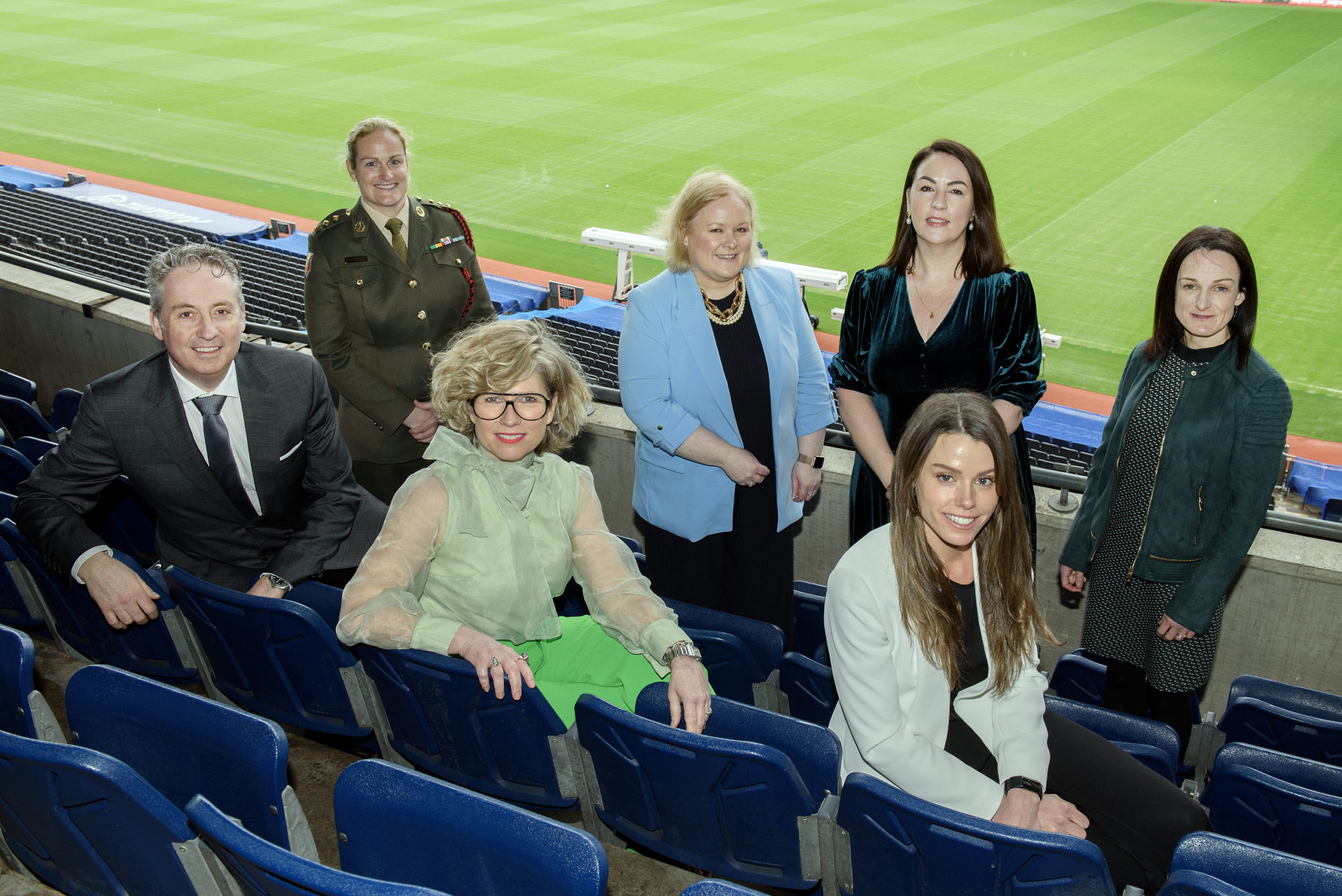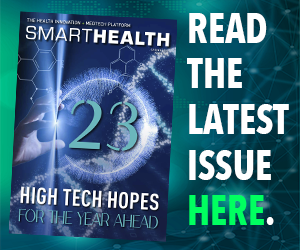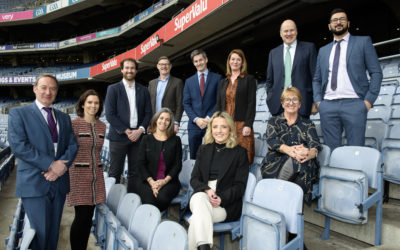Pictured above is Shay Walsh, managing director, BT Ireland, Captain Jane O’Neill, Engineer Corps, Irish Defence Forces, Lorna Martyn, Ireland regional chair & senior vice president technology, Fidelity Investments, Rhonda Doyle, senior director Field Services Operations UK&I, Schneider Electric, Karen Blakely, director, Strategy and Enabling Programs, MSD, Sonya Lennon, founder, Work Equal & Summit Host and Laura Dunlop, Women in STEM conference director, iQuest & Business Post LIVE; Sinéad Crowther, founder and chief executive, Soothing Solutions. Pictures by Maura Hickey
The second annual Women in STEM summit returned with inspiring stories, food for thought and hope for a future where true equity is achieved
It was a packed room and a packed schedule for the Women in STEM Summit 2023, which took place in Croke Park on Wednesday, March 15.
Sarah Murphy, chief executive of the Business Post, opened by mentioning that there were 550 people in attendance at the summit, almost double the number that had attended in 2022 – a real testament to the need for an event like this.
Before she finished, Murphy announced the Women in STEM Awards 2023, a black-tie event that will take place on Thursday, October 26 in the Mansion House to celebrate the incredible achievements of women in STEM in Ireland.

READ MORE ABOUT THE WOMEN IN STEM AWARDS 2023 HERE
The summit then kicked off with the chair, Sonya Lennon, speaker, writer, and social entrepreneur, mentioning how close this subject was to her heart. “The lack of representation of women in STEM is not a women’s issue, it’s not even a business issue, it’s a societal issue,” she said.
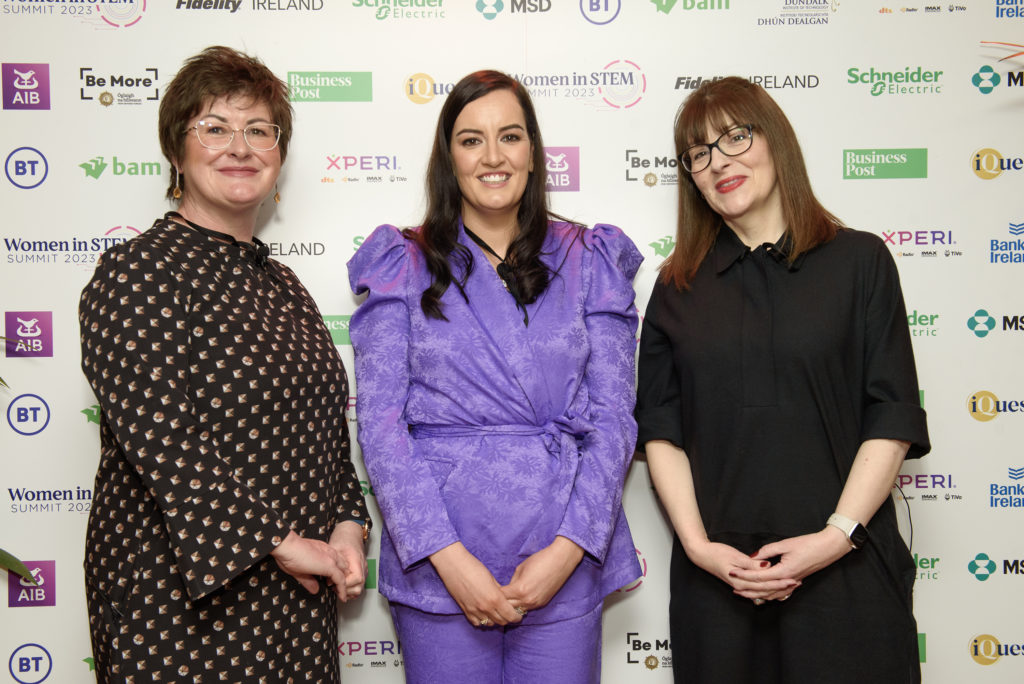
Elaine Gennery, Valerie Joy and Dr Margaret Kennedy of the WiLD Programme
Reflecting on your own biases
The opening address was on embracing equity to inspire the future women of STEM and saw Dr Katriona O’Sullivan, digital skills lecturer at Maynooth University, bringing the inspiration in droves.
Speaking about her experiences in a frank, honest and charming manner, she detailed her journey from a tough upbringing to taking part in the Trinity Access Programme and becoming an award-winning university academic.
Throughout, she highlighted how important it was for people to open doors and that much of how our current system is set up works against people from uneducated and working-class backgrounds.
“The most important thing is to reflect on your own biases,” she said. “Before you can do anything to change the system, you need to think about what you believe. Do you believe you got here through merit?
“Do you believe that all the achievements in your career were to do with you or did you have so much support around you? If you can
recognise that, then you can think differently and I hope you can help people.”
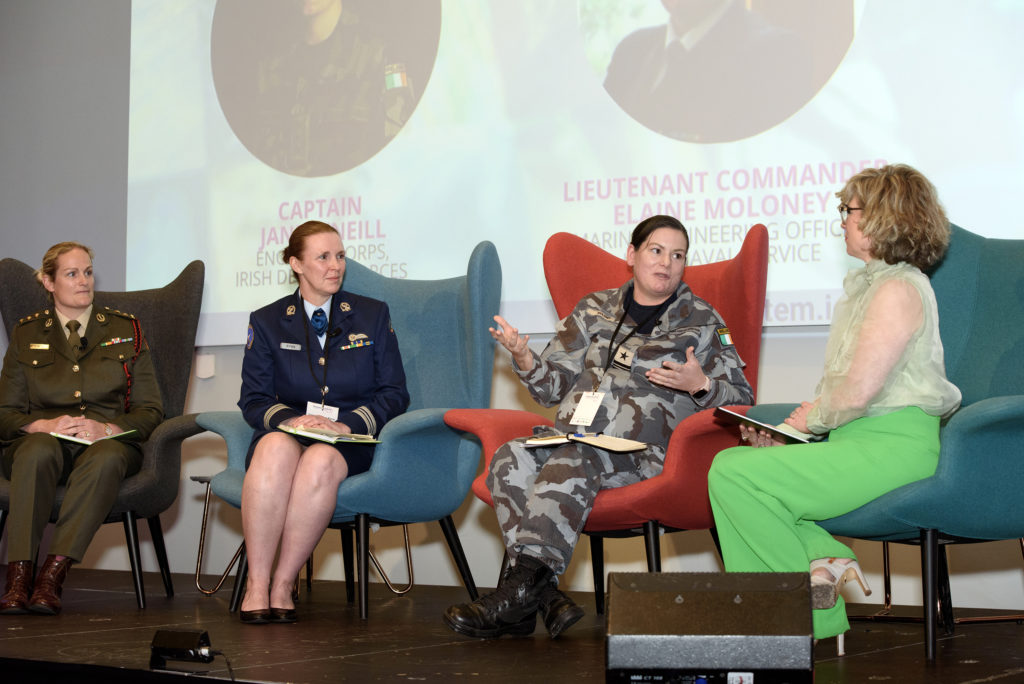
Dr Katriona O’Sullivan, Digital Skills Lecturer, Maynooth University; Captain Jane O’Neill, Commandant Karen Rynn and Lieutenant Commander Elaine Moloney of the Irish Defence Forces
Following this was the keynote address focusing on strategies for change to help women advance in STEM. Lorna Martyn, Ireland regional chair & senior VP of technology for Fidelity Investments, spoke about her early experiences and mentioned the importance of getting more women into senior management roles.
“You need to have an end-to-end fully integrated strategy where there are interventions at every single level,” she said. “That includes getting to those girls at Deis schools and bringing them into the future.”
The day’s first panel discussion looked at empowering women with the skills necessary to achieve this, with the theme of early intervention popping up.
This involved Karen Blakely, director, strategy & enabling programs at MSD; Professor Emer Smyth, research professor at ESRI; Dr Mary O’Riordan, founder and chief executive of HaPPE Earth and Emer Currie, Senator and spokesperson for NI, Special Education and Inclusion.
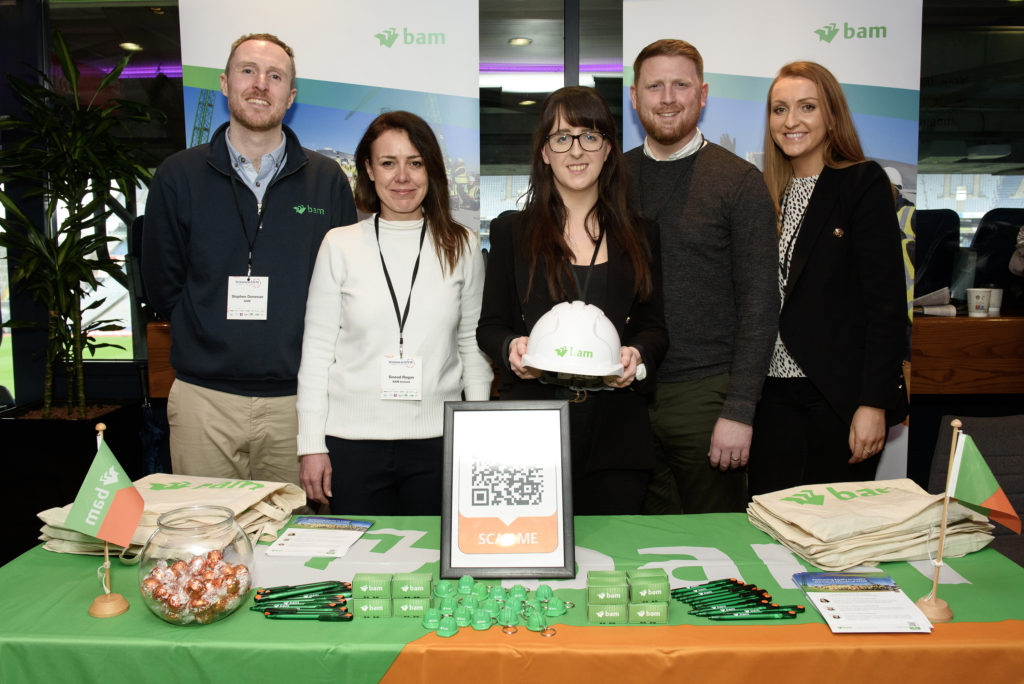
BAM and team at the Women in STEM Summit
During the panel discussion, Blakely mentioned that it isn’t about fixing women but ensuring that the entire journey is filled with supports, not just certain parts.
Before the networking break, there was a focus on the Irish Defence Forces and the STEM opportunities. Speaking with Lennon was Captain Jane O’Neill, Lieutenant Commander Elaine Moloney, and Commandant Karen Rynn.
When asked how best to engage young women in a career in the defence forces, Lieutenant Commander Moloney said it needs to be introduced as early as primary school level.
“We need to start introducing this at a young level before social norms and stereotypes take effect,” she said. “When people haven’t formed their opinions and biased thinking.”
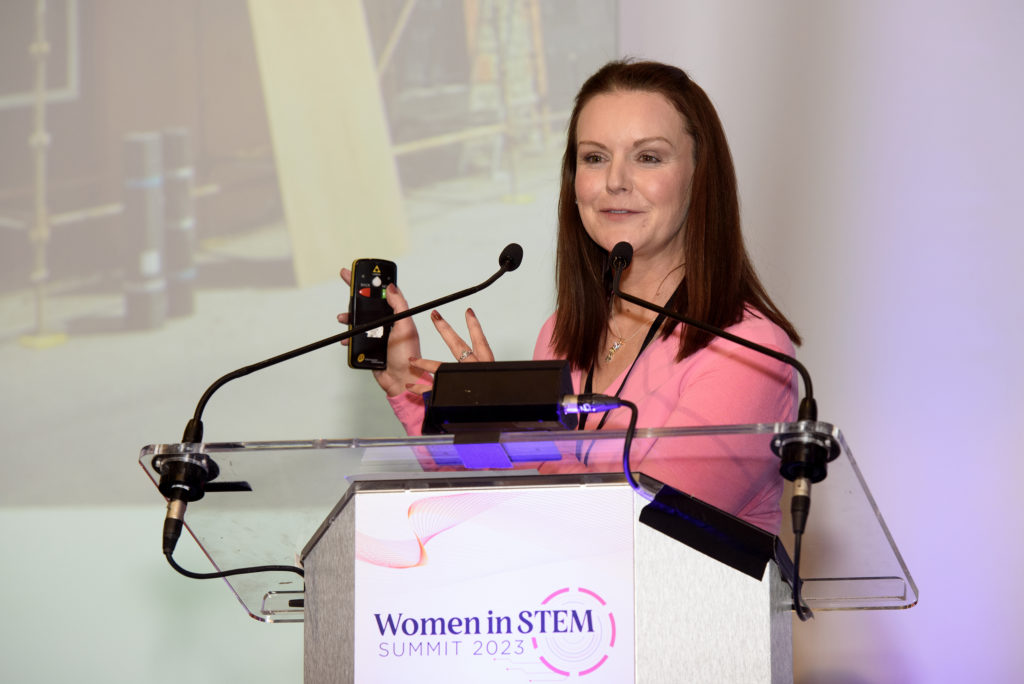
Sinéad Rogan, MEP manager, National Children’s Hospital
Pent-up talent pool
After the coffee break and exhibition viewing, the summit set its sights on education. The first panel discussion focused on preparing learners for the future.
It included Professor Hamsa Venkat, Naughton family chair in early years and primary STEM education at DCU; Dr Arlene Gallagher, founding director of Trinity Walton Club and John McKennedy, principal at St Colmcille’s Community School.
McKennedy highlighted the importance of valuing teachers more than we already do, as they have a significant impact on children’s futures, while Professor Venkat highlighted three main qualities teachers needed to have for this to succeed.
“The most critical point is to make sure we have teachers coming into the system who are confident, competent and enthusiastic about their teaching,” she said. “That’s really the only way we’re going to get far in preparing future generations.”
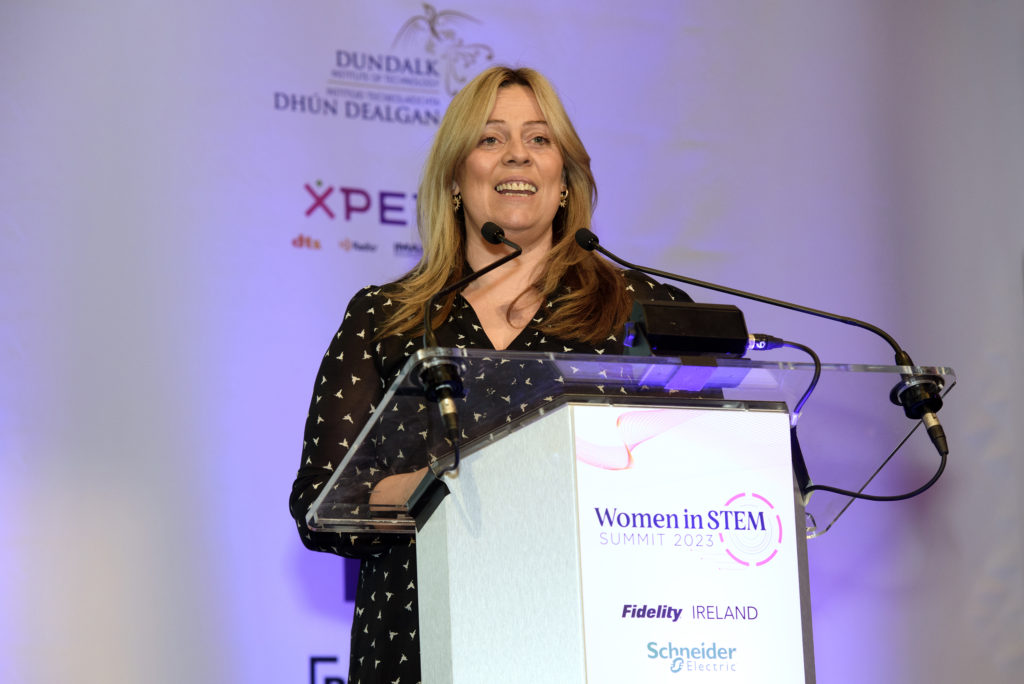
Next up was a case study on broadening participation in STEM through local smart city projects presented by Grace D’Arcy, engagement programme manager of Smart Docklands for Dublin City Council.
She emphasised the importance of citizen and community science and how their Academy of the Near Future programme empowers young people to use technology and sensors in their communities in order to tackle local environmental challenges.
Before lunchtime, the next segment looked at advancing women’s leadership in business. Beginning this segment was a case study on delivering a zero gender pay gap.
Speaking about the efforts An Post made, David McRedmond, chief executive, made the recommendation that a 50/50 gender shortlist, instead of giving a quota, would have the best result.
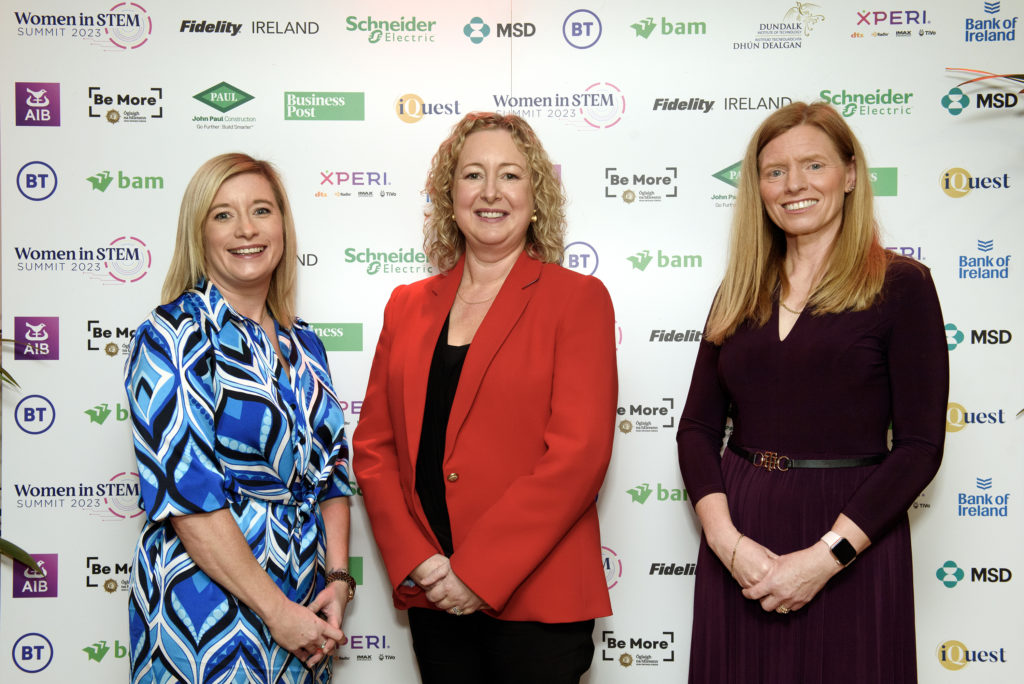
Kate Feeney, Sharon Walsh and Mary McMahon of Fidelity Investments
Upon adopting this method, 64 per cent of the cases saw them hire women which he described as “extraordinary” and highlighting a “pent-up talent pool”. “It’s about having the best talent,” he said. “Women who are held back, if you give them an equal chance, then not surprisingly more women will get selected.”
One of the day’s many highlights was hearing the stories of those who persevered and achieved great things, exemplified by Sinéad Crowther, founder and chief executive of Soothing Solutions.
Her spotlight talk was captivating, bringing laughs and tears in equal measure before deservedly ending with a standing ovation.
“I wished I believed in myself at the very start to do this,” she said. “My motivation was to protect my children … and people’s belief in me allowed me to start to see that I should believe in myself. My takeaway for you is go home and think about your motivation and how you are going to get it.”
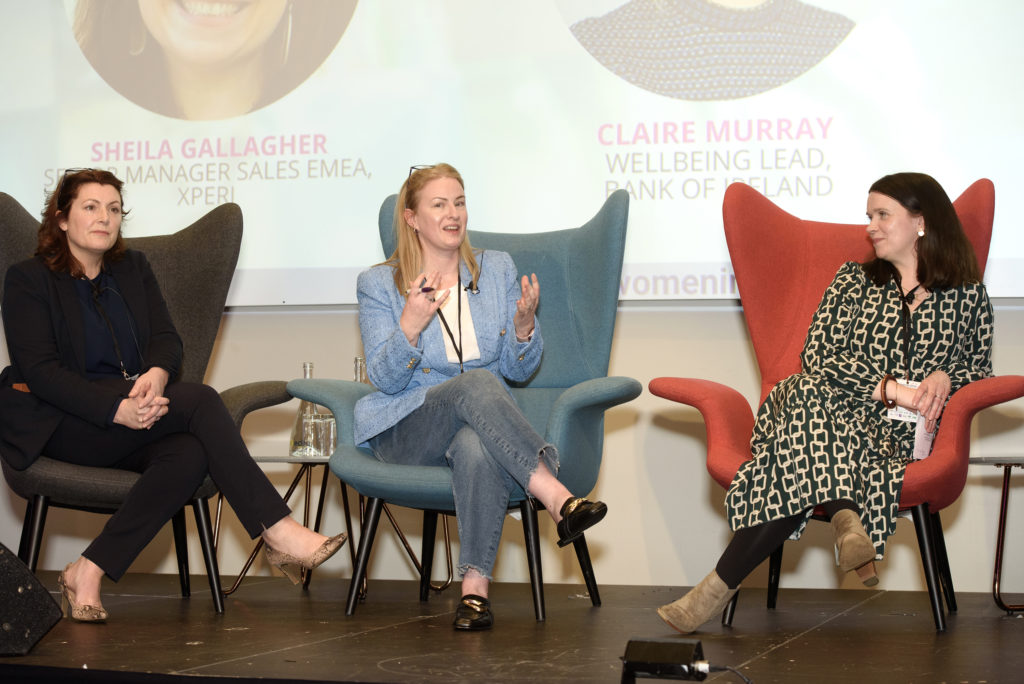
Lavina McGahon, Athena STEM Project Manager, Dundalk Institute of Technology (DKIT), Claire Murray, Colleague Wellbeing Lead and Senior Culture Manager, Bank of Ireland and Sheila Gallagher, Senior Manager, Sales Operations, Xper
Before the lunch break, there was room for one more panel discussion on delivering the ambitions set featuring Jean O’Donnell, board member of WITS; Rhonda Doyle, senior director of field services operations UK&I for Schneider Electric; and Shay Walsh, managing director of BT Ireland.
Referencing Crowther’s talk just before, Doyle mentioned that it brought up the question of what employers can do to help support women, citing Schneider Electric’s family-led policy, which provides flexibility to workers.
By accommodating those in different circumstances, you retain talent in the long term. The other reason for having policies that support women is that such considerations lead to greater work satisfaction, said Walsh.
Happier companies are better, more ethical and more profitable.
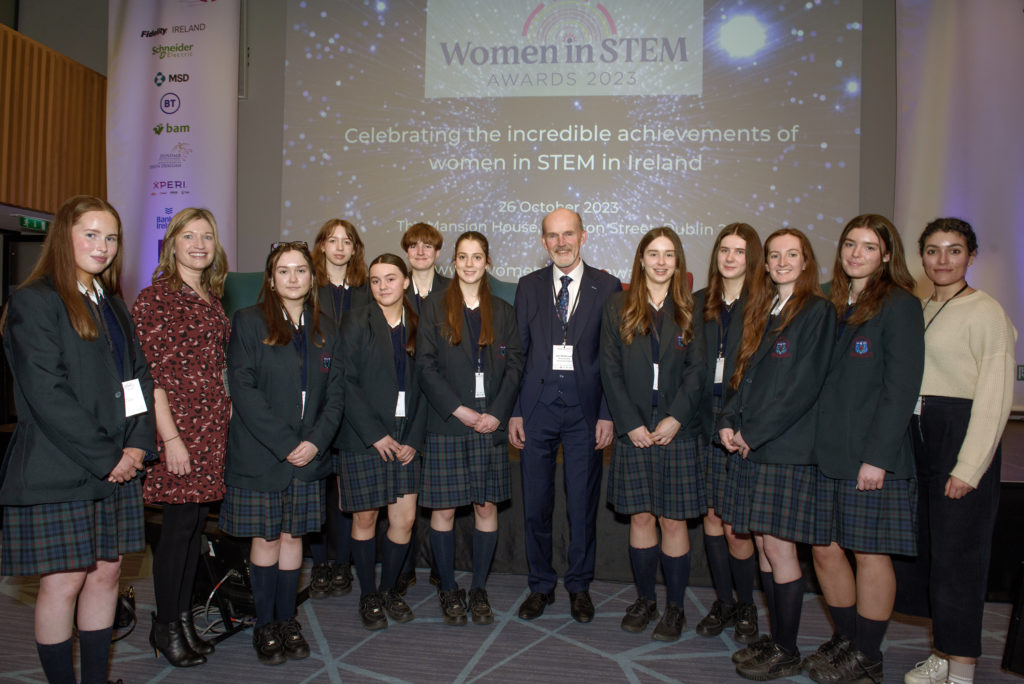
John McKennedy, principal with teachers and students of St Colmcille’s Community School
‘If you can’t see it, you can’t be it’
Once everyone returned from the lunch break, Dr Rhona Mahony, consultant obstetrician at NMH,took to the stage to chat about the
history of Irish women in STEM and to highlight the trailblazers.
She mentioned how the slow integration of women in medicine isn’t a capability issue, but a cultural one and takes hope from Irish women achieving so much with the odds stacked against them.
Next up was a fireside chat about retaining women in STEM with National Children’s Hospital BAM members Sinéad Rogan, MEP manager, and Suzy Hackett, chartered civil engineer.
Both touched upon another important point made throughout the day – role models. “If you can’t see it, you can’t be it,” said Hackett. “Role models are so essential and it’s to see someone and say ‘there’s a clear route for me so if I work hard, I can get there’.”
Rogan revealed a more startling piece of information with the gap in perception between men and women. In a survey, 85 per cent of women experienced gender bias, yet when men were asked what percentage of women experienced this, only eight per cent perceive that it would be over 75 per cent.
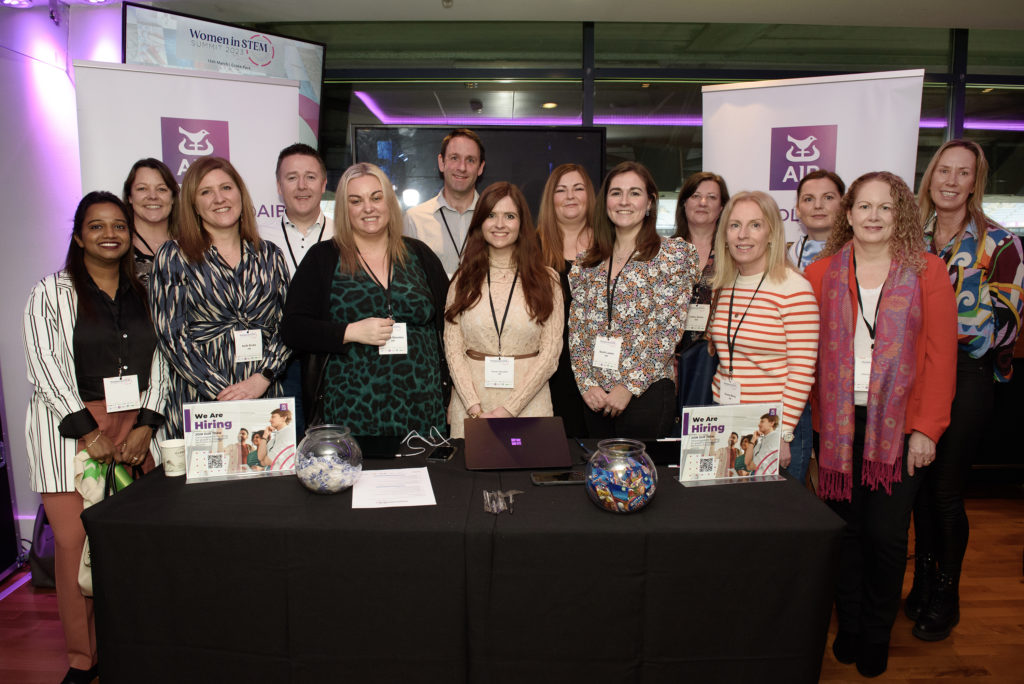
AIB team at Women in STEM Summit in Croke Park
The topic of role models continued with the following panel discussion which looked at fostering a new pipeline of female STEM talent featuring three members of Fidelity Investments, including Sharon Walsh, senior VP and head of asset management technology strategy & planning, Mary McMahon, scrum master, and Kate Feeney, senior manager, communications and CSR.
“One word that springs to mind is experience,” said Feeney. “Within these programmes, how are we providing real-life experience for these students that they can take away?”
“We have 11 and 12-year-olds come into Fidelity and live a day in the life. They see real-life role models talk to them about careers, how they started and their different backgrounds.”
The final fireside chat looked at the work the WiLD programme has done helping women in STEM get into leadership roles, the end of the talent pipeline. It featured Dr Margaret Kennedy, MD of Kennedy Insights, Valerie Joy, global distribution planning manager at Sanofi, and Elaine Gennery, founder of CareerVision.
“Women are getting stuck in middle management,” said Dr Kennedy. “There are lots of reasons, but what we discovered is apart from those structural issues, there’s a big issue with mindset and we can’t discount the impact of stereotyping.”
The closing panel discussion dealt with what the future held for women in STEM and how best to support women. It involved Sheila Gallagher, senior manager sales EMEA for Xperi, Claire Murray, colleague wellbeing lead and senior culture manager at Bank of Ireland (BOI), and Lavina McGahon, Athena STEM project manager at DKIT.
Speaking about the launch of BoI’s Family Matters package for employees, Murray said it was important for the organisation to both grow and move with women.
“It’s not just attracting women in STEM, but looking out for all of our women throughout their life cycle,” she said. “Whether it’s fertility, parenting, caring, surrogacy or menopause.”
Bringing the summit to a close, Lennon said that the big themes to take away were on education, perspective and questioning our behaviour intentionally.
REPORT > QUINTON O’REILLY
PICTURES > MAURA HICKEY

